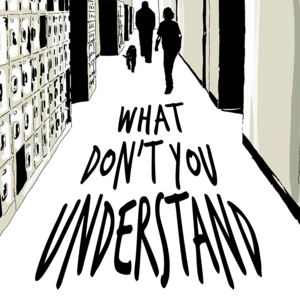How to Succeed in CS 303E
Having taught in UT Computer Science for 20+ years, and in other places before that, I have some insight into how to succeed in a class such as this one. By "succeed" I mean more than just getting a passing grade. I mean really learning the material, preparing yourself for CS313E, and being able to write Python programs with some competence.CS303E is a relatively challenging class. But it can also be quite an enjoyable class if you make it so. Below is some sage advice that you will do well to follow. This is pretty long, because I keep adding things as I see students make dumb mistakes. Trust me: It's worth your time to read this entirely so you won't make the same mistakes.
 Down the page are sections on:
Down the page are sections on:
- Keep Up.
- But Don't Get Too Far Ahead Either.
- Tell Us What You're Not Understanding.
- No Shortcuts.
- Read/Work Carefully.
- Don't Do Dumb Stuff.
- Keep in Touch.
- If Something is Wrong, Complain Promptly.
- If It Becomes Hopeless
- If you Need a Certain Grade, Earn It.
- We Can't Accommodate Everyone.
- Don't Be That Kid.
- There's Always a Highest B.
- A Generic Suggestion: Get to Know Your Professors.
- Using ChatGPT or other Generative AI.
- DON'T CHEAT.
Keep Up.
Many of you are very smart and coasted through high school and you may have coasted through a few semesters here without having to work very hard. This could be the course where that strategy fails you.
 This course is about learning to program competently. The
material of this course builds over the course of the semester. If
you get too far behind you may not be able to catch up.
This course is about learning to program competently. The
material of this course builds over the course of the semester. If
you get too far behind you may not be able to catch up.
Because the material is presented mostly asynchronously many students will procrastinate and put off viewing the videos and starting the assignments. That's a very bad idea. A significant percentage of students in this class don't start assignments until the day they are due. And then they are surprised when they miss the deadline. Don't be that student!
There will be weeks during the semester where you have an weekly homework due and also a quiz, exam, or project. That's just the way it is. You know from the first day of class when your tests fall, and you'll have around two weeks for each project. So plan ahead! If you wait until the last day to study or work on a project, it's not really our fault.
A common pattern is that the TAs office hours get really busy on the day any assignment is due. Students often sit in the waiting room for long periods and sometimes can't get in at all. The underlying cause is that folks are scrambling to get the assignment done before the deadline. If you wait until the last day to start, you may find yourself in that situation. Start early!
Another pattern is that I'll receive a message from a student saying: "Can I have an extension on the project due tomorrow, because it's a holiday in my religious tradition." And I'll say with a sigh, "OK. But didn't you realize that anytime over the two weeks since this project was assigned." If there's some obvious conflict, start earlier! Extensions don't really work to your advantage because that just means that you have that less time before the next deadline.
For example, we don't cover Python lists until week 9. We
don't cover try-except exception handling at all. If you
read ahead or have previous programming experience, you might be
tempted to use lists on some of the earlier assignments, or exception
handling at any time. Don't do it! In general, only use
features for any assignment that we have covered in class before or
during the week that the assignment is due. You will lose points if
you use programming constructs that we haven't covered. It's not that
those constructs aren't perfectly appropriate to use (later), it's
just that doing so now may cause you to neglect some construct we want
you to learn! If in doubt, ask whether a given construct is OK for a
particular assignment. In general, if we haven't covered it, don't
use it.
One of the best ways to get help is to post a message on Ed. That
way, not only will the TAs see it, other students will as well.
Someone is likely to respond quickly. But a message like "My program
isn't working; what's wrong?" just doesn't give enough information
for anyone to provide help. Tell us precisely how your program is
behaving, possibly including a snippet of code that seems to be the
problem.
But, on the other hand, don't give away too much in your
message. If you're posting large portions of code, make the
message private. That way it will only be seen by you and the
TAs. It's probably not a good idea to make the message visible only
to you and your specific TA or the instructor; include all of the
instructors. Any of the TAs may be able to help. If you have some
personal matter to discuss, send an email. But don't forget that
we can't discuss grades over email unless you explicitly say that
you're OK with doing that.
That includes commenting your code. Comments don't affect how your
program runs and you may think commenting is just a waste of time.
Trust me, learning to document (comment) your code is one of the most
important parts of learning to be a good programmer. (I work with an
automated reasoning system called ACL2. The source code is hundreds
of thousands of lines of code; embedded comments are more than half
of that.) Years from now when you're trying to figure out why one
of your programs works the way it does, you'll be glad you included
those comments. So please don't ask: Do I have to include comments?
Yes, you do! Exception: you don't have to comment your code on
quizzes or exams.
Follow directions. Maybe you don't see why having that blank
line in your output is important. But part of learning to program is
learning to follow a specification precisely. If we say that
you need some feature, don't push back; just do it.
As you learn new constructs, go back over your earlier programs and
improve your code by using those simpler, more elegant techniques. If
you do that, your programming skills will increase quickly. But
remember: don't use constructs we haven't covered in assignments
you're turning in. If you're not sure, ask.
Programming is not a spectator sport. The only way to learn to program
is to program. Find projects of your own that you can program. Do
extra exercises from the book. We'll frequently offer you some
additional practice problems during the semester. Go over the
programs in the lectures carefully until you understand them
thoroughly, not only how they work but why they're coded that way. If
you can find an alternative way to solve the problem, try it out.
Think of computing as an experimental science. Python makes it
particularly easy to try things out. Rather than ask "what would
happen if I did X," just try it.
Read assignments carefully. The TAs and I get pretty tired of
answering questions that are clearly answered in the assignment
write-up. After you've read the assignment carefully, if you still
don't understand, then ask. Some of the assignments are several pages
long. I know! But if your reason for missing points is TL;DR, my
response will be RTDA (read the damn assignment).
Read due dates carefully. If you wait until the last day to
start an assignment, that's not our fault. Schedule your time
accordingly. On every assignment, we get messages from students
saying: "I turned it in 5 minutes after midnight. Can it be counted
on time?" If you have two weeks for an assignment and still miss the
deadline by 5 minutes, it's because you didn't start early enough. If
it's late, it's late.
Often someone will post on Ed a message like: "I know my program
is correct; the interpreter/autograder/operating system/universe must
be defective." Check it again; it's almost certainly your program
that's wrong, even if you don't see why it is.
Also, if you have some emergency or situation that negatively impacts
your performance in the class, let your TA know right away. If
personal circumstances mean that you need an extension on a deadline,
inform your TA right away, but do it in advance. If the deadline has
already passed, it's less likely that we'll give you an extension.
We've had students come to us during the final week of classes and say
something like: "I haven't been to class for the past two months
because my grandmother died/I broke my arm/my computer crashed/I was
depressed." Our response may be: "Didn't you have access to a phone
or email or a friend who could let us know?" Take responsibility for
your own success or failure. We can't fix everything in your life for
you.
Occasionally students think they've dropped the course, only to get a
very unpleasant shock at the end of the semester. If you do drop or
withdraw, verify that your drop or withdrawal went through. It's a
pain to try to fix things after the fact.
Another option to consider before dropping the course is to change
it to pass/fail. The deadline for doing that is usually the same
as for dropping the course. It can take a tremendous amount of stress
off. You only need a D- to pass and, for a pass/fail course, D- is
the same as an A, at least from the perspective of your transcript.
However, notice that you can't count a pass/fail course toward the
Elements Certificate, so don't do this lightly. Also, some of the
same circumstances mentioned above that preclude dropping may prevent
you from changing to pass/fail. Check with your advisor.
On the syllabus is listed a score adequate to receive any specific
grade. If you need to receive a certain grade in the class to
preserve your standing in your department, in the university, or in
life earn it during the semester. At the end of the semester,
it's too late.
No matter when a test, quiz, project deadline is scheduled, there will
always be some of the hundreds of students in the class for whom
that's not a perfect or even possible time. Your excuse may be
perfectly reasonable. But we can't reschedule a major exam because
you have to work, you have another test that day, or anything else.
There likely will be a makeup opportunity, but it's up to you to work
with us to make sure that things get done. It's a lot easier for you
to change your work schedule than for us to rearrange a test time for
which 500 other students have made arrangments.
The exam dates are available from the first day of the semester; put
them on your calendar and re-arrange your schedule if needed. Don't
plan to leave town before the final and expect us to accommodate your
plans. Taking exams is part of your responsibility as a student. For
assignments, you'll always have a full week or longer to complete
them. Schedule your time to get the assignment done by the due date.
Your failure to schedule your time does not constitute an emergency
for us.
Quizzes are typically offered at four different times
throughout the day, often at 8am, noon, 4pm and 8pm. If you can't
make any of those times, maybe you're just too busy. Students
sometimes tell me they're taking 18 hours and working three jobs. You
can't really do anything well if you're trying to do everything!
Quizzes are scheduled periodically throughout the semester. They
don't count very much, so don't freak out if you miss one. The best
way to think about quizzes is as if they were pop quizzes; if you
missed a pop quiz because you didn't come to class that day, you
wouldn't expect to be able to make it up. In our current asynchronous
arrangement, we'll announce quizzes in advance. But if you can't take
it for whatever reason, you won't be given the chance to make it
up, even if your excuse is a good one.
There are some circumstances where you'll just have to let it go. If
you're taking a quiz and your computer crashes or the fire alarm goes
off or a meteor hits your house, there's just not a lot we can do
about it. Your excuse for missing a quiz or not turning in your
homework on time may be perfectly valid, but that doesn't mean you'll
automatically get an extension or a makeup. Things happen that are
outside our control and yours; we just can't fix everything for
you.
All three exams will be given in the Friday class, at the usual
location and place. Be sure to attend the session for which you are
registered. On the schedule posted the first day of the semester if
information about when exams fall; arrange your schedule so that you
can be there. Don't plan anything that conflicts. Each exam counts a
significant portion of your grade. Why would you think you can miss
any?
For projects, you'll have two weeks or more to do them. If you need
an extension, it's almost certainly because you put it off until the
last minute. Don't be that student who always needs an extension or
has to take a makeup. You're a college student now. Take
responsibility for your own success!
The numerical average that divides an A from an A-, say, is also
listed in the syllabus. We reserve the right to be more generous in
setting that boundary, based on the number of students in each range.
For example, we may decide that there should be more A's and lower the
threshold for obtaining an A from that in the syllabus. We will
never raise the threshold. This means that you know at the
beginning of the semester what average you need to guarantee
yourself an A in the class.
But there will always be some student with the lowest average assigned
an A and some other student with the highest average assigned an A-.
If you are the second of those, this does not qualify as unfairness to
you. So please don't ask us to raise your grade because you were
that close to getting an A. If you need an A, work hard during
the semester to ensure that you're above the published threshold. If
you are, you're guaranteed an A in the class. If not, your strong
desire or your perceived need for an A won't be a factor.
No guarantees, but I tend to round up at least a half point. So if
the published cutoff for A is 93 and your average is 92.6, you'll
probably get an A. But if the cutoff has already been curved
to 92, I probably won't round any more. So a 91.6 won't get an A
under those conditions.
During your time at UT, get to know your professors. Many of them
will welcome the interest you show in them and their research. Visit
during office hours; interact in class. Show them you're interested
in what they can teach you. That way, when it's your time to ask for a
letter, they'll have something helpful to say. And you may develop a
meaningful relationship that will help you for the rest of your
academic and professional career, and maybe even acquire an
interesting and knowledgeable friend.
If you do use ChatGPT or other AI to write code for you, it's very
likely that you'll be caught. It's hard to get any of these systems
to write code that satisfies the requirements of your assignments,
e.g., only using constructs that we've covered to that point in the
class. It's pretty easy for us to spot code that's just too polished
to have been written by a beginning programmer.But Don't Get Too Far Ahead Either.
You are certainly welcome to read ahead. But understand that the
assignments are designed to build your skills methodically in the use
of particular aspects of Python programming. Later in the semester
you will learn Python features that would have made some of the
earlier assignments quite a bit easier. Some of you have previous
programming experience and may know about these features. But
don't use constructs on assignments that we haven't covered in class
yet.Tell Us What You're Not Understanding.
Sometimes instructors forget what was hard for us back when we
started programming. I may accidentally use some unfamiliar CS
concept or jargon not realizing that everyone doesn't know that. If I
use a term that you don't know or don't explain something adequately,
please let me know, so I can make sure you're following the content
and adjust my language. I really want you to succeed, but you can't
if you don't know what I'm talking about. And I won't be able to
correct things if I don't know that something's wrong. By the way, sometimes the issue will be with language I use in the
videos. These videos have been re-recorded repeatedly to replace some
I originally made in Fall 2020 with help from videographers with the
College of Natural Sciences. The current set is not very polished,
but I thought it more important to update them than to have high
production values. If there's language in there you don't understand,
ask and I'll explain. Also, I may have added clarification to the
slides; check there.
By the way, sometimes the issue will be with language I use in the
videos. These videos have been re-recorded repeatedly to replace some
I originally made in Fall 2020 with help from videographers with the
College of Natural Sciences. The current set is not very polished,
but I thought it more important to update them than to have high
production values. If there's language in there you don't understand,
ask and I'll explain. Also, I may have added clarification to the
slides; check there. No Shortcuts.
In programming, there are good ways to write code and lousy ways. We
always get questions like: "Why do I have to break my code into
functions? Why can't I just write everything at the top level? It
works!" Yes, but it's horrible programming practice. Programming is
about more than coding some solution to a problem. It's about coding
an elegant, understandable, maintainable solution that you can be
proud of. We're trying to teach you good programming practice that
will help you in every program you write in the future. Read/Work Carefully.
Many points are lost on homeworks and tests because the student
answered the question they were expecting, and not the one actually
asked. Read the questions carefully. Then, if you don't understand
the question, ask for an explanation! (Even during a quiz, if you
don't understand the question, ask on Ed; but don't send
an email during a quiz because we probably won't see it in time
to give you a timely answer.)Don't Do Dumb Stuff.
 Students often tend to lose points (or worse) just because they're
careless. For example, all of the following have happened in recent
semesters:
Students often tend to lose points (or worse) just because they're
careless. For example, all of the following have happened in recent
semesters:
All of these happen every semester. As they say in computer security:
"You can't patch dumb!"
Keep in Touch.
Because there are so many students in the various sections of this
class, we're dividing you up into groups by last name. Your primary
point of contact to ask questions about grading is the
TA assigned to you. If you ask Dr. Young why you lost points on some
homework assignment, he won't have a clue, because he didn't grade
it. Go to your TA first. But for general help, contact any of
the TAs or attend their office hours.If Something is Wrong, Complain Promptly.
At the end of the semester, we often hear something like, "If I hadn't
gotten half a point off of HW3 I'd have a B instead of a B-. Can't
you regrade HW3?" The time to haggle over points on any given
assignment or exam is immediately after you get the grade. At the end
of the semester, we don't have time to re-grade a bunch of stuff that
was probably graded appropriately the first time. If you don't agree
with a grade, resolve your differences in a timely manner.
If It Becomes Hopeless
 Most semesters, there were 600+ students in the class at the start of
the semester and about 475 at the end. The TAs and I are here to help
you succeed, and we'll do all that we can. But sometimes a student
will discover that, despite their best efforts, they have no passion
and/or no aptitude for programming. That's nothing to be ashamed of.
It's very likely that I wouldn't be any good at your major. If you
find that you're hopelessly behind or totally lost, you have several
options:
Most semesters, there were 600+ students in the class at the start of
the semester and about 475 at the end. The TAs and I are here to help
you succeed, and we'll do all that we can. But sometimes a student
will discover that, despite their best efforts, they have no passion
and/or no aptitude for programming. That's nothing to be ashamed of.
It's very likely that I wouldn't be any good at your major. If you
find that you're hopelessly behind or totally lost, you have several
options:
Notice that taking an incomplete in the class generally will not be
an option. Incompletes seldom turn out well. In one recent
semester, I gave two incompletes; neither student finished the work.
Incompletes turn into an F after a year. The next semester, you will
have other classes to worry about and finishing this class won't be a
priority. Your TA may have left; I'll have new classes to teach. Do
the work during the semester it's assigned.
If you Need a Certain Grade, Earn It.
At the end of each semester, there are always a few students who say
one of the following:
The next question is always: "Can you give me some extra work to raise
my grade?" We would love to help, but it's illegal and unethical to
offer an opportunity to one student not offered to everyone in the
class. We may offer extra credit opportunities, but if so they'll be
offered to everyone and offered during the semester. We can't give
you special treatment. So please don't ask. We Can't Accommodate Everyone.
As it says in the "Keep in Touch" section above, we'll try to work
with you if you have some special situation. Contact your TA. But
there are limits.Don't Be That Kid.
 It seems that there are always a few students who always have an
excuse why they didn't get the assignment done or couldn't take the
test on time. They always seem to get sick or have to go see their
ailing grandma or have to go out of town for a debate tournament
whenever there's an exam or a project due. If you have a legitimate
excuse for an absence, we'll try to find a work-around. But, just
because your excuse is legitimate doesn't mean that we will
accommodate you at all costs. We're not going to make up a special
exam just because you missed the regular exam and the scheduled
makeup. We're not going to give you an online exam when everyone else
it taking an in-class exam just because you decided you'd take the
class from Australia.
It seems that there are always a few students who always have an
excuse why they didn't get the assignment done or couldn't take the
test on time. They always seem to get sick or have to go see their
ailing grandma or have to go out of town for a debate tournament
whenever there's an exam or a project due. If you have a legitimate
excuse for an absence, we'll try to find a work-around. But, just
because your excuse is legitimate doesn't mean that we will
accommodate you at all costs. We're not going to make up a special
exam just because you missed the regular exam and the scheduled
makeup. We're not going to give you an online exam when everyone else
it taking an in-class exam just because you decided you'd take the
class from Australia. There's Always a Highest B.
You're assigned a letter grade at the end of the semester based on a
numerical average computed from your work throughout the semester.
That's done using the percentages for exams/assignments listed in the
course syllabus. Given your scores, you should be able to estimate
your current grade in the class. (Don't trust the running averages
that Canvas is showing you; they don't include things proper
weighting, items dropped, extra credit, etc.)A Generic Suggestion: Get to Know Your Professors.
 This one isn't really about this specific class, but classes in
general. Get to know your professors, particularly the professors in
your major. Many, many times students come to me asking for a
recommendation letter, usually when they're getting ready to graduate
and looking for a job or applying for grad school. Here's what I
usually tell them: "What can I say about you, other than the fact that
you did well in my class or whatever I can glean from your resume or
transcript? A weak letter is likely worse than no letter at all."
This one isn't really about this specific class, but classes in
general. Get to know your professors, particularly the professors in
your major. Many, many times students come to me asking for a
recommendation letter, usually when they're getting ready to graduate
and looking for a job or applying for grad school. Here's what I
usually tell them: "What can I say about you, other than the fact that
you did well in my class or whatever I can glean from your resume or
transcript? A weak letter is likely worse than no letter at all."Using ChatGPT or other Generative AI.
I'm sure you've heard about ChatGPT and the other AI platforms built
on large language models. You may have played with them or even used
them to help with some of your assignments in previous classes.
ChatGPT, in particular, can write simple Python code. You may be
tempted to use it to help you with your assignments. Don't do
it. It is considered cheating in this class to turn in code that
you didn't write. That includes code that someone else wrote for you,
code you found on-line, or code that an AI system wrote. If
you're caught cheating, you may fail the class and be reported to the
Dean of Students' office.
 Many students begin every assignment by immediately going to Google,
trying to find something that might keep them from having to solve the
problem for themself. That is an incredibly stupid thing to
do. You won't learn the material, which you'll need on exams.
But more importantly, you're starting down a slippery slope that's
liable to send you tumbling over the edge. Suppose you find something
up to and including a complete solution to the assignment that some
idiot has posted on GitHub or Chegg.com; ask yourself if you will have
the self-discipline not to use it. You may naively believe that
changing variable names and reordering code will keep you from being
caught. But with very high likelihood, that's not true. Every
semester, students learn this the hard way. It's just not worth it!
You're not as good at cheating as you think you are; and we're very
good at catching cheating.
Many students begin every assignment by immediately going to Google,
trying to find something that might keep them from having to solve the
problem for themself. That is an incredibly stupid thing to
do. You won't learn the material, which you'll need on exams.
But more importantly, you're starting down a slippery slope that's
liable to send you tumbling over the edge. Suppose you find something
up to and including a complete solution to the assignment that some
idiot has posted on GitHub or Chegg.com; ask yourself if you will have
the self-discipline not to use it. You may naively believe that
changing variable names and reordering code will keep you from being
caught. But with very high likelihood, that's not true. Every
semester, students learn this the hard way. It's just not worth it!
You're not as good at cheating as you think you are; and we're very
good at catching cheating.